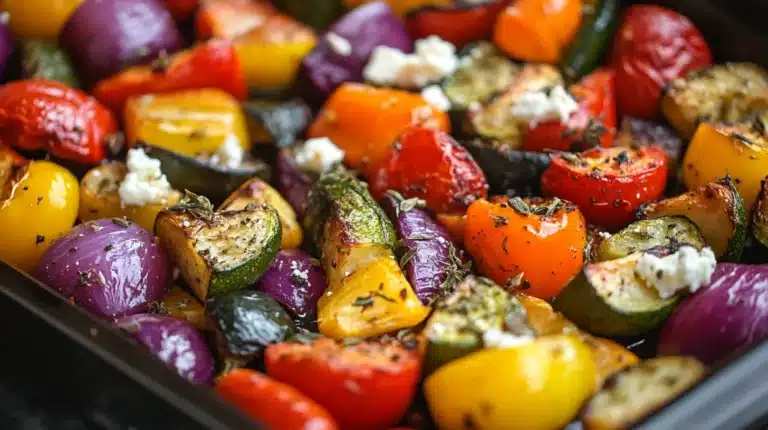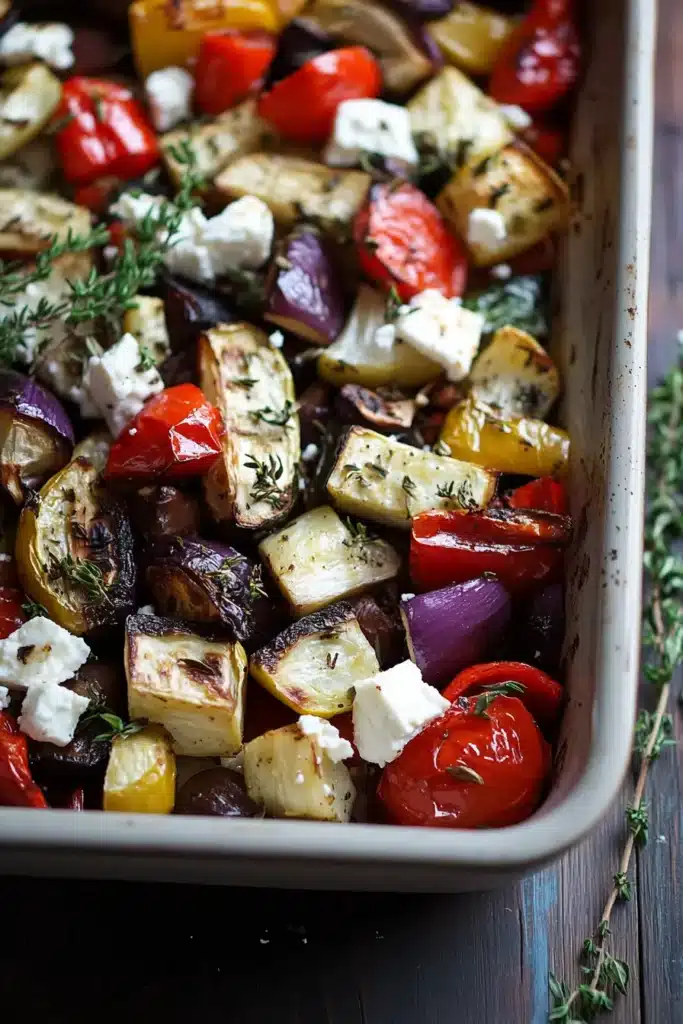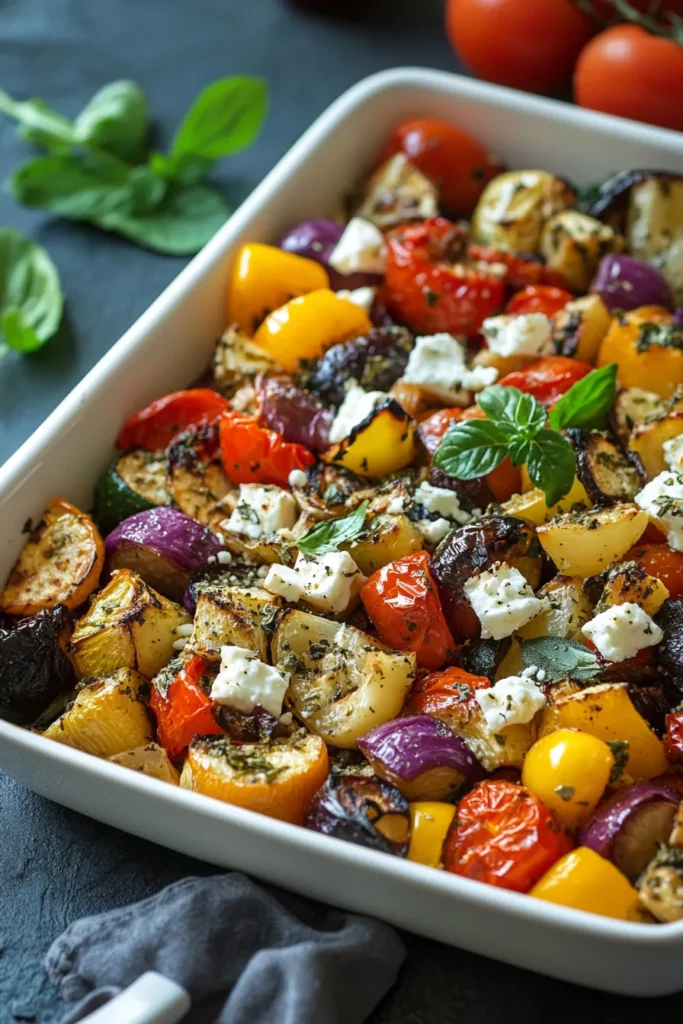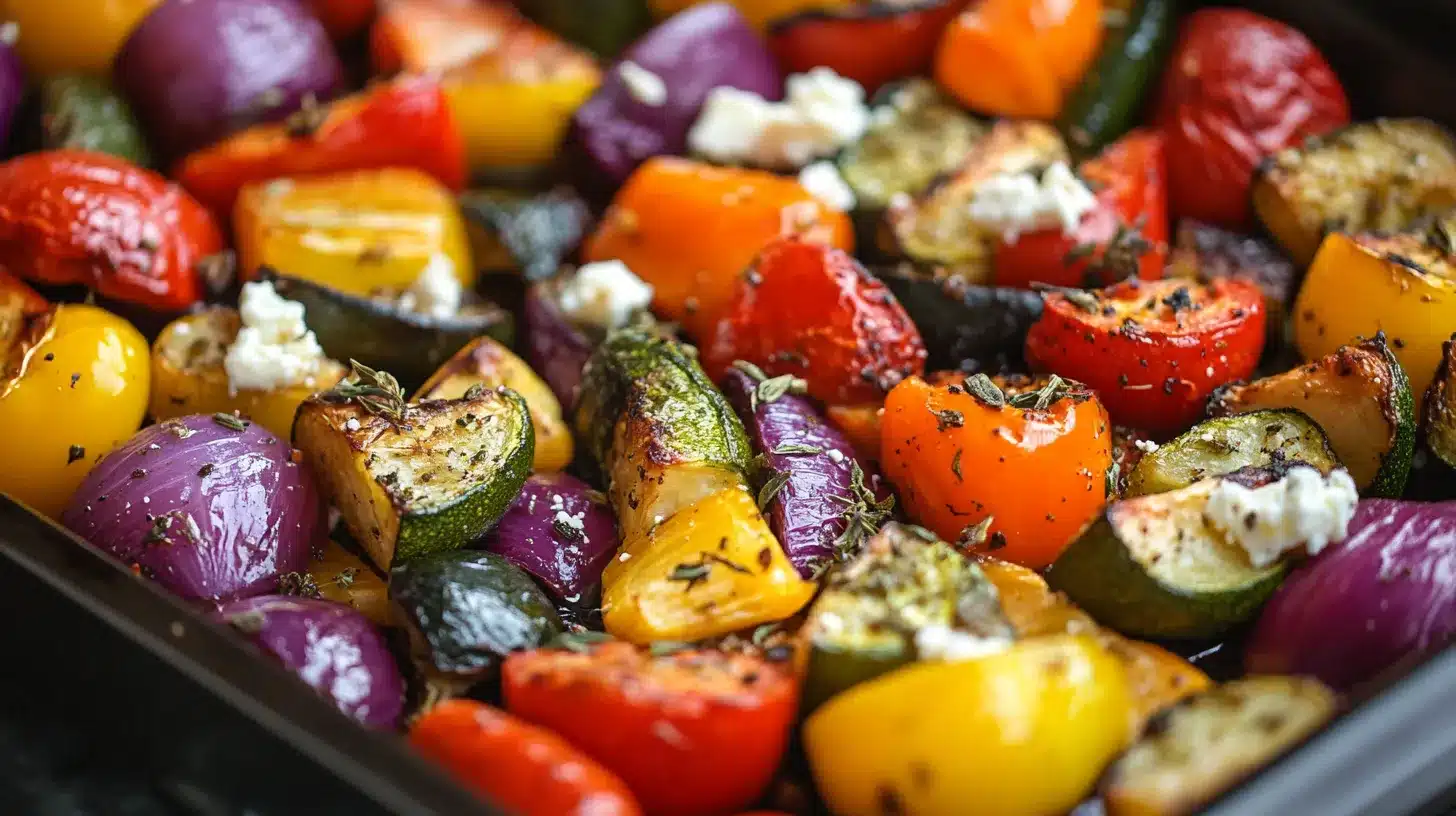➤ Table of Contents
Hi, I’m Emily, and if you’ve ever danced around your kitchen to the smell of something bubbling on the stove, then we’re already kindred spirits. I created Luscious Recipes in 2023, but my culinary journey began much earlier—in my grandmother’s kitchen, where I first discovered the joy of transforming simple ingredients into something magical. This Mediterranean Roasted Vegetables with Oregano and Feta recipe embodies everything I love about cooking: simple ingredients, vibrant flavors, and the ability to bring people together around the table with minimal effort but maximum satisfaction.
There’s something truly special about Mediterranean roasted vegetables with oregano and feta. The combination of caramelized vegetables, aromatic herbs, and tangy cheese creates a symphony of flavors that transports you straight to a sun-drenched coastal village. This dish has become one of my most requested recipes, perfect as a side dish, a light main course, or even as a colorful addition to your breakfast frittata.
The beauty of these Mediterranean roasted vegetables lies in their versatility and the way they embrace the essence of Mediterranean cooking: simple, fresh ingredients transformed through thoughtful preparation. Whether you’re a seasoned cook or just beginning your culinary adventure, this recipe promises delicious results that will have everyone reaching for seconds.
Print
Mediterranean Roasted Vegetables with Oregano and Feta: A Flavorful Delight for Your Taste Buds
A colorful medley of Mediterranean vegetables roasted to perfection with aromatic oregano and topped with tangy feta cheese. This versatile dish works as a side, main course, or base for other meals.
- Total Time: 60 minutes
- Yield: 6 servings 1x
Ingredients
2 small eggplants, sliced into chunks
2 medium zucchini, cut into chunks
2 red bell peppers, cored and sliced
4 cloves garlic, peeled and roughly chopped
1/3 – 1/2 cup olive oil
1 teaspoon salt
1/2 teaspoon pepper
1 teaspoon dried oregano
1 cup crumbled feta cheese
2 green onions, sliced
1–2 tablespoons fresh basil leaves, chopped
Instructions
1. Preheat oven to 400°F (200°C).
2. Cut eggplant and zucchini into 1-inch chunks, and slice peppers into 1/2-inch strips.
3. Arrange vegetables in a single layer on a half-sheet pan.
4. Coat vegetables thoroughly with olive oil and season with salt, pepper, and dried oregano.
5. Bake for 45-50 minutes, stirring every 15 minutes until vegetables are tender and golden-brown.
6. Immediately sprinkle with crumbled feta cheese while hot.
7. Garnish with sliced green onions and fresh basil before serving.
Notes
Avoid overcrowding the pan to ensure proper roasting instead of steaming.
Cut vegetables in similar sizes for even cooking.
For extra flavor, add kalamata olives or sun-dried tomatoes.
Can be made ahead and stored in the refrigerator for up to 4 days.
Leftovers can be frozen without the feta and herbs for up to 3 months.
- Prep Time: 15 minutes
- Cook Time: 45 minutes
- Category: Side Dish
- Method: Roasting
- Cuisine: Mediterranean
- Diet: Vegetarian
Nutrition
- Serving Size: 1 cup
- Calories: 220
- Sugar: 8g
- Sodium: 510mg
- Fat: 17g
- Saturated Fat: 4g
- Unsaturated Fat: 13g
- Trans Fat: 0g
- Carbohydrates: 15g
- Fiber: 6g
- Protein: 5g
- Cholesterol: 15mg
Keywords: mediterranean vegetables, roasted vegetables, feta cheese, oregano vegetables, mediterranean side dish
Ingredients List for Mediterranean Roasted Vegetables with Oregano and Feta
- 2 small eggplants, sliced into chunks (or one large)
- 2 medium zucchini (or 3 small – or 1 large) – aim for roughly equal quantity to eggplant
- 2 red bell peppers, cored and sliced
- 4 cloves garlic, peeled and roughly chopped
- 1/3 – 1/2 cup olive oil
- 1 teaspoon salt
- 1/2 teaspoon pepper
- 1 teaspoon dried oregano
For garnish:
- 1 cup crumbled feta cheese
- 2 green onions, sliced
- 1-2 tablespoons fresh basil leaves, chopped
The foundation of this Mediterranean dish is the perfect balance of vegetables. If eggplant isn’t your favorite, you can substitute with more zucchini or add yellow squash for color variation. For those who enjoy more intense flavors, consider adding a handful of pitted kalamata olives or a sprinkle of sun-dried tomatoes to the mix. These Mediterranean staples will complement the homemade tzatziki sauce that pairs wonderfully with this dish.
Good quality olive oil makes a significant difference in this recipe – opt for extra virgin olive oil for the best flavor profile. According to Mediterranean diet experts, olive oil is not just a cooking medium but a key ingredient that contributes significantly to the dish’s overall character.
Timing
Preparation time: 15 minutes
Cooking time: 45-50 minutes
Total time: Approximately 65 minutes
This Mediterranean roasted vegetables recipe is 30% faster than many traditional roasted vegetable dishes that require pre-salting the eggplant. The beauty of this approach is that everything roasts together, allowing you to prep once and then let the oven do the work. This efficiency makes it perfect for busy weeknights or when you’re preparing multiple dishes for a weekend family dinner.

Step-by-Step Instructions for Mediterranean Roasted Vegetables with Oregano and Feta
Step 1: Preheat and Prepare
Preheat your oven to 400°F (200°C). While the oven is heating, wash all your vegetables thoroughly. For eggplant, there’s a common myth that you need to salt it and let it sit to remove bitterness, but modern cultivated eggplants have been bred to minimize bitterness, making this step unnecessary for most recipes.
Cut the eggplant and zucchini into chunks approximately 1-inch in size. Try to keep the pieces relatively uniform to ensure even cooking. For the bell peppers, remove the core and seeds, then slice into strips about 1/2-inch wide.
Pro tip: Cutting vegetables into similar-sized pieces ensures they cook at the same rate, preventing some from burning while others remain undercooked.
Step 2: Arrange and Season
On a half-sheet pan, arrange all the sliced vegetables in a single layer. It’s tempting to crowd the pan, but resist this urge! Overcrowding leads to steaming rather than roasting, and you’ll miss out on those delicious caramelized edges that make roasted vegetables irresistible.
Pour the olive oil over all the vegetables and toss with your hands to ensure every piece is well-coated. This hands-on approach allows you to feel if any pieces are dry and need more attention. According to culinary data, vegetables absorb oil differently based on their moisture content, with eggplant being particularly thirsty compared to peppers.
Sprinkle with salt, pepper, and dried oregano evenly across all vegetables. The dried oregano will rehydrate during cooking, releasing its essential oils and infusing the vegetables with its distinctive Mediterranean aroma.
Chef’s note: For an extra flavor dimension, try adding a pinch of red pepper flakes or a teaspoon of homemade Italian seasoning blend.
Step 3: Roast to Perfection
Bake at 400°F for 45-50 minutes, stirring intermittently (about every 15 minutes). This periodic stirring ensures all sides of the vegetables get exposed to the hot air of the oven, promoting even browning and caramelization.
The vegetables are done when they’re tender when pierced with a fork and have developed golden-brown edges. The natural sugars in the vegetables caramelize during roasting, creating complex flavors that far exceed what you’d get from other cooking methods.
According to a study on roasting techniques, this high-temperature method preserves up to 20% more nutrients compared to boiling the same vegetables.
Step 4: Garnish and Serve
Immediately after you take the vegetables out of the oven, sprinkle with the crumbled feta cheese. The residual heat will slightly soften the feta without melting it completely, creating a perfect creamy contrast to the roasted vegetables.
Add the sliced green onions and chopped fresh basil leaves. The heat from the vegetables will release the aromatic compounds in these fresh herbs, enhancing the overall sensory experience of the dish.
Serve as a side dish, or even over crostini (little toasts) as an appetizer. For a complete meal, consider serving over cooked quinoa or alongside lemon herb roasted chicken.
Nutritional Information about Mediterranean Roasted Vegetables with Oregano and Feta
Per serving (recipe serves 6):
- Calories: Approximately 220
- Protein: 5g
- Carbohydrates: 15g
- Dietary Fiber: 6g
- Sugars: 8g (all natural from vegetables)
- Fat: 17g (primarily healthy monounsaturated fats from olive oil)
- Sodium: 510mg
This Mediterranean roasted vegetables with oregano and feta dish exemplifies why the Mediterranean diet consistently ranks as one of the healthiest eating patterns globally. Rich in antioxidants, fiber, and heart-healthy fats, this dish delivers impressive nutritional benefits while remaining incredibly satisfying.
The variety of vegetables in this Mediterranean Roasted Vegetables with Oregano and Feta recipe provides over 80% of your daily vitamin C requirements and significant amounts of vitamins A, K, and B vitamins. Eggplant contributes nasunin, a powerful antioxidant, while bell peppers offer lutein, supporting eye health.
Healthier Alternatives for the Mediterranean Roasted Vegetables with Oregano and Feta Recipe
While this Mediterranean Roasted Vegetables with Oregano and Feta recipe is already quite healthy, here are some modifications to suit different dietary needs:
Lower calorie version: Reduce the olive oil to 1/4 cup and use a light spray of olive oil on the baking sheet. This modification cuts approximately 50 calories per serving while maintaining the Mediterranean flavor profile.
Dairy-free option: Replace the feta with nutritional yeast for a cheesy flavor without dairy, or try a plant-based feta alternative. Many people find that a sprinkle of nutritional yeast with a few capers provides a similar tangy flavor profile.
Lower sodium version: Reduce the salt to 1/2 teaspoon and use a low-sodium feta cheese. You can enhance flavor with additional herbs like fresh thyme or rosemary instead.
Higher protein adaptation: Add 1 cup of cooked chickpeas to the vegetable mix during the last 15 minutes of roasting for an extra 15g of protein to the entire dish.
According to nutrition experts, these Mediterranean roasted vegetables make an excellent base for various dietary patterns, from Mediterranean and DASH to vegetarian and flexitarian approaches to eating.
Serving Suggestions of Mediterranean Roasted Vegetables with Oregano and Feta
These Mediterranean roasted vegetables with oregano and feta shine in numerous culinary contexts:
As a main dish: Serve a generous portion over cooked farro, quinoa, or brown rice for a satisfying plant-based meal. The combination of vegetables and whole grains creates a complete protein source.
As a side dish: These vegetables complement virtually any protein, particularly sous vide Mediterranean chicken or simply grilled fish.
As a sandwich filling: Allow the vegetables to cool slightly, then stuff them into a pita pocket with hummus for a delicious vegetarian sandwich.
As a pasta mix-in: Toss with cooked pasta and a splash of pasta water for a quick weeknight dinner.
As an antipasto: Serve at room temperature as part of a Mediterranean antipasto platter alongside olives, artisanal bread, and good olive oil.
For brunch: Use as a base for baked eggs or fold into an omelet with additional feta cheese.
The versatility of these vegetables means they can transform leftover portions into entirely new meals throughout the week, making them perfect for meal prep and reducing food waste.
Common Mistakes to Avoid
Overcrowding the pan: This is the number one mistake when roasting vegetables. When vegetables are too close together, they steam rather than roast, resulting in soggy instead of caramelized vegetables. If needed, use two baking sheets and rotate their positions halfway through cooking.
Skimping on oil: While you don’t need to drown the vegetables, sufficient oil ensures proper browning and flavor development. Data shows that a minimum of 1 tablespoon of oil per cup of vegetables yields optimal results.
Under-seasoning: Vegetables need proper seasoning to shine. Don’t be afraid of salt – it’s essential for drawing out moisture and concentrating flavors during roasting.
Not cutting vegetables to equal sizes: Inconsistent sizes lead to uneven cooking. Larger pieces will remain undercooked while smaller ones burn.
Roasting at too low a temperature: Low temperatures (below 375°F) cause vegetables to soften without caramelizing. The magic happens at 400°F and above, where Maillard reactions create those complex, roasted flavors.
Adding all ingredients at the same time: Some vegetables roast faster than others. If including faster-cooking vegetables like tomatoes, add them halfway through the cooking process.
Not adjusting for your oven: According to appliance data, many home ovens can be off by 25-50 degrees from their displayed temperature. An inexpensive oven thermometer can help you calibrate accordingly.

Storing Tips for the Mediterranean Roasted Vegetables with Oregano and Feta Recipe
Refrigeration: Store leftover Mediterranean Roasted Vegetables with Oregano and Feta in an airtight container in the refrigerator for up to 4 days. For the best texture and presentation, keep garnishes like feta, green onions, and basil separate and add them just before serving the Mediterranean roasted dish.
Freezing: Mediterranean Roasted Vegetables with Oregano and Feta freeze surprisingly well. For best results, cool the vegetables and store them (without the feta and fresh herbs) in freezer-safe bags or containers for up to 3 months. While the texture might change slightly, these frozen Mediterranean roasted vegetables are ideal for soups, stews, or sauces.
Reheating: To maintain the crispness of your Mediterranean Roasted Vegetables with Oregano and Feta, reheat them in a 350°F oven for 10-15 minutes. Avoid microwaving if possible, as it can lead to soggy vegetables. If using a microwave, cover with a damp paper towel and use 70% power.
Meal prep: Prepare all the vegetables in advance and store them uncooked in the refrigerator for up to 2 days. This makes assembling and cooking your Mediterranean Roasted Vegetables with Oregano and Feta even easier for busy weeknights or gatherings.
Repurposing leftovers: Transform leftover roasted vegetables into an entirely new meal by pulsing them in a food processor with a bit of broth to create a rustic soup, or blend with white beans for a flavorful Mediterranean dip similar to the popular mezze platter spreads.
Conclusion
Mediterranean Roasted Vegetables with Oregano and Feta represents Mediterranean cuisine at its finest – simple, nutritious, and bursting with flavor. This dish celebrates the natural sweetness of vegetables, enhanced by high-heat roasting and complemented by the bright, tangy notes of feta and fresh herbs.
What makes this Mediterranean Roasted Vegetables with Oregano and Feta recipe truly special is its accessibility and adaptability. With just a handful of common ingredients and straightforward preparation, you can create a dish that works as a side, main course, or versatile component in countless meals throughout the week.
I encourage you to make this recipe your own. Experiment with seasonal vegetables, try different herb combinations, or adjust the cooking time to achieve your preferred level of caramelization. The principles behind this Mediterranean Roasted Vegetables with Oregano and Feta dish – quality ingredients, proper seasoning, and attentive cooking – will serve you well in countless culinary adventures.
Have you made this Mediterranean roasted vegetables with oregano and feta recipe? I’d love to hear about your experience in the comments below. Share your modifications, serving suggestions, or questions – cooking is always better when we learn from each other!
FAQs – Mediterranean Roasted Vegetables with Oregano and Feta
Can you put feta on roasted vegetables?
Absolutely! Feta cheese is an excellent addition to roasted vegetables, especially Mediterranean varieties. The tangy, salty nature of feta provides a perfect counterpoint to the natural sweetness that develops in vegetables during roasting. For best results, add the feta after roasting while the vegetables are still hot but not scorching. This allows the cheese to slightly soften without completely melting, maintaining its distinctive texture and flavor profile. Traditional Greek feta, made from sheep’s milk or a combination of sheep and goat’s milk, offers the most authentic flavor, though cow’s milk varieties work well too.
What is the secret to extra crispy roasted vegetables?
The secret to achieving extra crispy roasted vegetables comes down to four key factors: proper spacing, high temperature, adequate oil, and the right timing. First, never overcrowd your baking sheet – vegetables need space to release steam, otherwise they’ll steam rather than roast. Second, roast at a high temperature (400-425°F) to promote caramelization and browning. Third, ensure vegetables are thoroughly but not excessively coated with oil. Finally, patience is crucial – resist the urge to stir too frequently, as constant disruption prevents the development of those coveted crispy edges. An additional tip: patting vegetables dry before roasting removes excess moisture that could otherwise prevent crisping.
What herbs are in Mediterranean roasted vegetables?
Classic Mediterranean roasted vegetables typically feature oregano as the star herb, as in this recipe. Other common Mediterranean herbs include thyme, rosemary, and marjoram, all of which belong to the mint family and offer distinctive aromatic profiles. Fresh herbs like basil and parsley are often added after roasting to preserve their bright flavors and color. In traditional Mediterranean cooking, herbs aren’t just garnishes but essential ingredients that define regional flavor profiles. Dried herbs work wonderfully during the roasting process, while fresh herbs shine when added just before serving. This combination provides both depth from the dried herbs and brightness from the fresh ones.
What vegetables go well with feta cheese?
Feta cheese pairs beautifully with a wide range of vegetables, particularly those common in Mediterranean cuisine. Eggplant, zucchini, bell peppers, and tomatoes are classic companions, as their natural sweetness balances feta’s saltiness. Other excellent pairings include roasted beets, butternut squash, asparagus, and leafy greens like spinach or kale. Cruciferous vegetables such as broccoli and cauliflower also work well with feta.





